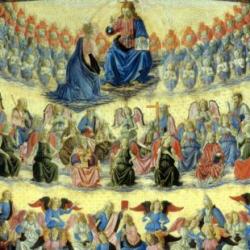Christians dogmatically assert that God created the angels. But the Bible never explicitly says this, nor does it say angels had an origin. The Jewish Encyclopedia well observes, “Upon the important problem of the origin of angels Biblical writers do not touch; but it is inferred [in the Jewish Bible] that angels existed before the Creation (Gen. i. 26; Job, xxxviii. 7).”
Notice that the above statement cites two biblical references. Genesis 1.26 says in the NRSV, “Then God said, ‘Let us make humankind in our image” (NRSV throughout unless otherwise noted). Jews interpret the “us” as a reference to angels. I think this is correct and that it probably refers to a special group of angels, perhaps God’s royal council of angels in heaven or a class of angels called “archangels.” The traditional Christian interpretation that “us” in Genesis 1.26 signifies a trinity of three persons in a godhead is not only unsupported in the context but in the entire Bible.
The book of Job tells about Satan causing God to test his righteous servant Job with various tragedies to get him to curse God. Although Job never did, he complained of the lack of justice since he had suffered undeservedly. Then we read, “Then the LORD answered Job out of the whirlwind; ‘Who is this that darkens counsel by words without knowledge? Gird up your loins like a man, I will question you, and you shall declare to me. Where were you when I laid the foundation of the earth?… when the morning stars sang together and all the heavenly beings shouted for joy?'” (Job 38.1-4, 7). God obviously refers to when he created the earth. Both Jewish and Christian Bible scholars unanimously say “heavenly beings”–beni elohim in the Hebrew text, literally translated “sons of God”–refer to angels. Thus, this text infers, as the Jewish Encyclopedia states, “that angels existed before the Creation.” Since the Bible only identifies one creation of God, it being that of Genesis 1-2, the Bible never says God created the angels prior to when he “created the heavens and the earth” (Genesis 1.1).
The foremost Bible text that scholars cite to support their assertion that God created the angels is Psalm 148.1-6. It reads as follows in the NRSV: “Praise the LORD! Praise the LORD from the heavens; praise him in the heights! Praise him, all his angels; praise him, all his host! Praise him, sun and moon; praise him, all you shining stars! Praise him, you highest heavens, and you waters above the heavens! Let them praise the name of the LORD, for he commanded and they were created. He established them forever and ever; he fixed their bounds, which cannot be passed.” These scholars claim that the words in v. 5, “they were created,” refer to everything in vv. 1-4. Thus, they insist God created the “angels” and “host” (angelic armies) mentioned in v. 2.
This interpretation of Psalm 148.1-6 is erroneous because both nouns in the Hebrew text of v. 2–malachi for “angels” and tsabam for “host”–have the personal pronoun suffix. That is why the NRSV here translates them “his angels” and “his host,” meaning they belong to God. Consequently, the verse does not refer to all angels as these scholars presume, as if it also includes Satan and his angels. Some might argue that all angels did belong to God until what they call “the fall” of those angels into sin, thus “fallen angels.” But that is a presupposition not supported in the Bible.
Furthermore, portions of Psalm 148.3-6 echo other Bible texts which refer to creation in Genesis 1. For instance, the words, “he commanded and they were created,” allude to the first six days of creation wherein we read that “God said” and something was created. Also, compare the “sun and moon” being “established forever and ever” (vv. 3, 6) with various Old Testament verses that say likewise (Psalm 33.6, 9; 89.36-37).
Moreover, the words, “fixed their bounds, which cannot be passed,” in Psalm 148.6, must refer to God’s creation, as in Genesis 1, and therefore cannot apply to angels. Jeremiah refers to the same in his well known text which reads, “Thus says the LORD, who gives the sun for light by day and the fixed order of the moon and the stars for light by night,… If this fixed order were ever to cease from my presence, says the LORD, then also the offspring of Israel would cease to be a nation before me forever” (Jeremiah 31.35-36). Applying “bounds” to angels doesn’t make sense. Moreover, it contradicts Jude saying, “the angels who did not keep their own position, but left their proper dwelling, he [God] has kept in eternal chains in deepest darkness for the judgment of the great day” (Jude 6).
Some scholars cite Ps 33.6 to support their belief that God created the angels. It says, “By the word of the LORD the heavens were made, and all their host by the breath of his mouth.” These scholars think “host” (Heb. tzabam) refers to the angels. But this word is used frequently in the Hebrew Bible for either God’s army of angels or the stars in the cosmos. The context is the determining factor. Since Ps 33.6-9 obviously refers to God’s creation of the universe, as in Ps 148.3-6, tzabam refers to the stars here in Ps 33.6. It’s second clause merely repeats the concept of the first clause, which clearly refers to God’s creation of “the heavens.”
Some readers of the King James Version may cite Ps 104.4 to support their belief that God created the angels. It reads, “Who maketh his angels spirits; his ministers a flaming fire.” But all major, modern versions read as the NRSV or similarly, “you make the winds your messengers, fire and flame your ministers” (cf. Heb 1.7).
Regarding the New Testament, some Bible scholars cite Colossians 1.16 to support their assertion that God created the angels. It says of Jesus, “for in him all things in heaven and on earth were created, things visible and invisible, whether thrones or dominions or rulers or powers—all things have been created through him and for him.”
First, the Greek text of Colossians 1.16 has tois ouranois. It can be translated either “the heavens” or “(the) heaven.” I think it is rightly translated “the heavens” in the NASB and wrongly translated “heaven” here in the NRSV as well as the NIV and ESV. These latter three versions translating it “heaven” makes it refer to the heaven where God and angels dwell. On the contrary, whenever “(the) heaven(s) and (the) earth” are mentioned together in the Bible, this phrase refers to everything in the universe besides the earth as “the heavens.” In that case shamayim/ouranos should be translated in the plural. Thus, Colossians 1.16 does not mean God created everything in the heaven where he and angels dwell. It doesn’t say anything about that.
Second, it is unlikely that the twice-mentioned expression “all things” in Colossians 1.16, which is panta in the Greek text, refers to angels. For instance, most modern Bible versions translate archai in v. 16 as “rulers,” which would indicate persons such as humans or angels. But archai here can be translated “principalities” or the like, as the KJV does, which does not indicate personalities but rather the realm of rule of personalities. This corresponds better to the two previous nouns in the Greek text, which are thronoi and kuriotetes, here translated “thrones” and “dominions” respectively, because they do not indicate personalities either. The same issue arises concerning the last of these four Greek nouns, exousia, which are here in the NRSV and in the KJV translated as “powers.” The NASB, NIV, and ESV here translate it “authorities,” indicating personalities. But it also can be translated “powers,” as it is here in the NRSV and the KJV, which does not indicate personalities. Thus, all four nouns are better understood as referring to position rather than person.
Third, the final words “for him” in Colossians 1.16 mean that everything God created during the creation period described in Genesis 1 was for Jesus. If that includes the angels, of which there are two types—God’s angels and Satan’s angels—then we must understand Paul to be saying that Satan’s angels were created for Jesus, that is, that they belong to him, which is ludicrous and therefore must be incorrect.
That’s about it concerning biblical texts that scholars cite to support their view that the Bible says God created the angels–pretty much only Psalm 148.1-6 and Colossians 1.16. That’s a pretty paltry sum of scriptures for such an important topic if it is true. Indeed, when it comes to the importance of topics that have to do with the God of the Bible, God creating the angels would be right up there in importance with God creating human beings. And its not like the Bible only tells us about humans beings and the earth, so that heaven and angels is “off limits.” The Bible has not a little information about God and the angels in heaven.
What difference does it make whether we believe God created the angels or we simply say we don’t know? It could make a lot of difference for some people regarding the question of theodicy. That is, “how could a just and loving God create a universe that has so much suffering and wickedness?” It is the premiere question atheists pose to theists. Theists who believe God created Satan, who accomplished man’s fall into sin, create for themselves a deep hole from which they try to climb out.













